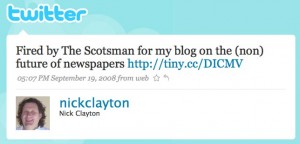Earlier this week Journalism.co.uk picked up an update to Twitter from Nick Clayton, technology journalist, weekly tech columnist for the Scotsman, and recently signed-up blogger for Scottish media news website Allmediascotland (AMS):

The blog post in question – published on Friday 19 – mentioned, amongst other things, Clayton’s attempts to sell his house and the following statement, which seems to have riled The Scotsman:
“All but one of the too many estate agents I spoke to told me not to bother advertising in The Scotsman. Whether you’re looking for work or a home, the web’s the place to go.”
Clayton was told he was fired by Alison Gray, editor of the paper’s Saturday magazine, just hours after the post was put live, with it cited as the key reason behind his sacking.
“I’d written a slightly controversial blog entry for allmediascotland.com suggesting that, as websites replace printed newspapers, there would be little need for physical offices and that the role of the sub-editor would disappear. I hoped it would be a little provocative, but the most I expected was to have a few virtual brickbats lobbed in my direction,” said Clayton, in a follow-up piece.
Journalism.co.uk tried contacting the Scotsman, leaving messages with Alison Gray and the office of Tim Bowdler, chief executive of Scotsman Publications, but received no response to the following:
– does the Scotsman have a set policy on staff writing for external websites? and are journalists aware of this?
– could the blog post have been amended to prevent Clayton from losing his job?
– why was Clayton sacked for his comments on the state of print advertising after the Scotsman itself ran the story ‘Johnston Press hit by house market woes as property advertising slides’ on August 28?
Admittedly there’s no disclaimer on Clayton’s AMS blog – e.g. ‘the views expressed here are my own and do not reflect those of my employer’ etc etc – but nevertheless was this the right course of action for the Scotsman to take?
There’s nothing to stop a journalist from setting up their own personal blog or contributing in their professional capacity to another blog site – either as poster or commenter – and as the trend for doing so continues to grow more popular, will publishers start setting out stricter guidelines for what staff can and can’t say elsewhere?
Reactions like this and the idea of more stringent restrictions on where journalists can write online are counterproductive: letting journalists write, comment, engage and react with colleagues and readers online can help build an online community around them and their content, driving users back to the publisher’s site.
Spilling company secrets is one thing, but Clayton’s post was hardly exposing something that’s hidden from the rest of the newspaper industry.
Clayton has told me he’s contacted the National Union for Journalists (NUJ) (who haven’t got back to me either for that matter) – and I’ll be really interested to hear its stance on this: firstly, in reaction to the immediacy of his sacking; and more importantly, as to what this means for journalists working online, in multimedia and for multiple taskmasters.

